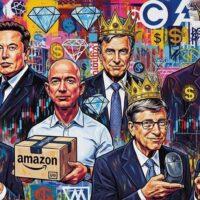The case of Elon Musk’s acquisition of Twitter (now known as X) is one of the clearest examples of why it is risky to challenge billionaires. Twitter employees once criticized and mocked Musk on the platform, assuming their influence and collective resistance would protect them. Instead, Musk turned the tables by buying the company outright in 2022, reshaping it entirely on his terms.
From Criticism to Control
In early 2022, Twitter staff and leadership resisted Musk’s growing influence after he purchased a large stake in the company. Employees openly debated his vision, some even targeted him in internal Slack discussions. Within months, Musk countered by offering to buy the platform outright for $44 billion. After legal and boardroom drama, the deal went through, and Musk had full control of the company.
Key moves Musk made immediately after taking over:
- Fired top executives, including CEO Parag Agrawal and CFO Ned Segal.
- Cut over 50% of staff, reducing the workforce from about 7,500 to roughly 3,000.
- Rebranded Twitter to X, signaling a long-term vision beyond social media.
- Shifted business model towards subscriptions and ad changes.
For a while, chaos followed. Advertisers pulled back, users complained, and media declared Twitter’s downfall. Yet, over time the platform stabilized under Musk’s rule, proving that the billionaire had the financial endurance to outlast criticism and restructure the platform on his terms.
Did Musk Really Ruin Twitter?
Many critics argued that Musk ruined Twitter by cutting staff and making rapid changes. However, history shows a different outcome. Despite turbulence:
- The platform continued to operate globally without major technical collapse.
- X maintained hundreds of millions of monthly active users.
- Financial losses were significant in the short term, but Musk had personal wealth exceeding $200 billion to absorb risks (Forbes).
Meanwhile, employees who opposed him remained unemployed or had to find new work elsewhere. The company did not collapse, and Musk faced no personal damage from the move.
Data Snapshot
| Metric | Before Musk (2022) | After Musk (2023–2024) | Trend |
|---|---|---|---|
| Employees | ~7,500 | ~1,500–2,000 | Sharp decline |
| Monthly Active Users | ~396 million | ~350–380 million | Mostly stable |
| Advertiser Spending | ~$5B annually | Down by ~50% in 2023 | Recovering slowly |
| Owner Net Worth | ~$220B | Still >$200B | Remained among world’s richest |
The Power of Billionaires
The story illustrates a broader lesson: billionaires operate on a completely different playing field. They can take risks, absorb losses, and shape industries in ways that ordinary employees or critics cannot. When you have billions in assets, legal teams, and the ability to purchase entire companies, resistance from individuals or even thousands of workers often collapses.
Why Challenging Billionaires Rarely Works
- Financial leverage: They can sustain losses longer than critics can sustain resistance.
- Legal power: With top-tier lawyers, lawsuits rarely derail their plans.
- Influence: Billionaires often own or can acquire the very platforms where they are criticized.
- Public attention: Controversy fuels their brand rather than destroys it.
- Replacement ability: Employees are replaceable, but capital is concentrated.
Historical Comparisons
Musk is not unique. History shows that powerful business figures often overpower internal resistance:
- Jeff Bezos: Faced criticism for Amazon’s work culture, but Amazon grew into a $1 trillion company regardless (CNBC).
- Steve Jobs: Fired from Apple in 1985, returned in 1997, and rebuilt it into the most valuable tech company (Biography.com).
- Mark Zuckerberg: Survived major scandals like Cambridge Analytica while keeping full control of Meta (The Guardian).
Conclusion: Why You Shouldn’t Mess With Billionaires
The Twitter-to-X transformation shows one blunt truth: billionaires play by different rules. Employees who targeted Elon Musk lost their jobs, but Musk himself faced little consequence. His company stabilized, his wealth remained intact, and his vision prevailed. Billionaires have the resources, patience, and influence to bend situations to their favor. Challenging them without comparable power is often a losing game.
Recommended For You









